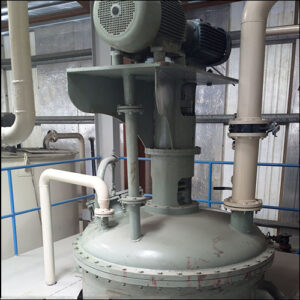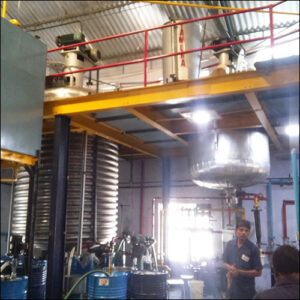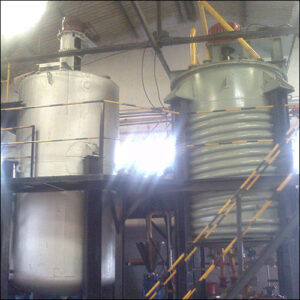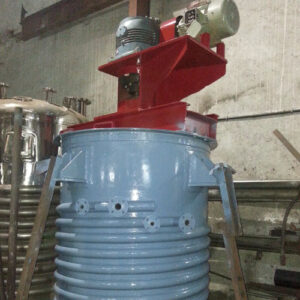Grease Plant
- Home
- Grease Plant

Enriched with keen understanding and knowledge in the areas of manufacturing grease plants, we are noted as one of the foremost manufacturers & exporters of Grease Plant. Our company is working in close coordination with our customers so as to know their precise demands and specifications. These plants are used in the manufacturing process of different greases. Our clients are widely appreciating this Grease Plant for its salient features such as low & high temperature performance, easy installation and long operational life.
We have been working closely with our clients to tailor machines to their requirements. We also offer trial runs on lab machines to get the manufacturing process right the first time.
We also undertake turnkey Projects for Grease Plant & Lube Oil Plants in india and all over the world.
SOAP TYPES GREASES
Metallic soaps + Lubricating Oils + Additives for imparting Special properties
NON SOAP THICKNER GREASES
Thickening Agent + Lubricating Fluid (Synthetic oils) + Additives for imparting Special properties
The value of plastic lubricants has been recognized since very early times when animal fats were used for Axles and the like. In general any lubricating fluid can be gelled by means of a suitable thickness to form a lubricating Grease. In practice mineral oils are almost exclusively used. For soap type Greases mineral oils of relatively low viscosity index 60 are preferred since the greater solvency of the more aromatic oils for soaps makes manufacture easier and gives greases with lower soap contents and with better properties.
Esters and silicones are used, only in greases for special applications, where cost is secondary to performance to meet low temperature and high temperature requirements; – 75ºC to + 320ºC.
The Soaps used are the metallic salts of long chain fatty acids derived from wide range of natural fatty materials. Soaps are mainly produced by specifying the fat or fatty acid with appropriate alkali in the presence of oil.
In some cases pre-formed soaps are used, such as aluminium stearate, lithium sterate etc.
Non Soap – Thickners
may be inorganic e.g. silica or clay or organic with a very high melting point . e.g. terephthalamates, arylureas (these may be either pre-formed or formed in situ) and the dye stuffs, indanthrene and phthalscyanine. They need to be oleophilic and this characteristic may be imparted either in the thickner formulation (i.e. by including a long chain hydrocarbon chain or surface esterification ) or by coating the particle surfaces with organic cations. In the latter case about 75 percent of the particle surface is covered, which gives the desired effect without affecting inter –particle forces too much. Pre-treated clays (i.e. coated and dried) need aids to facilitate dispersion in oil. These dispersion aids are low molecular weight polar organic compounds such as methanol, acetone, diacetone Alcohol and propylene Carbonate.
A satisfactory Grease for a given application is expected to:
- Provide adequate lubrication to reduce friction and to prevent harmful wear of bearing components.
- Protect against corrosion.
- Act as a seal to prevent entry of dirt and water.
- Resist leakage dripping or undesirable throw off from the lubricated surfaces.
- Resit objectionable change in structure or consistency with mechanical working (in the bearing) during prolonged services.
- Not stiffen excessively to cause undue resistance to motion in cold weather.
- Have suitable physical characteristics for the method of application.
- Be compatible with elastomer seals and other materials of construction in the lubricated portion of the mechanism.
- Tolerate some deqree of contamination, such as moisture, without loss of significant characteristics.
Soap Greases consist of dispersions of soap fibres in oil in concentrations mostly in the range 5 to 22%. By weight sometimes solid block greases contain 50 to 40% of soap.
The thickeners in non-soap greases are usually particulate rather than fibrous in nature and in this case the structure is maintained by 3 dimensional linkages due to very short range inter –particle forces (Vander waal’s forces). These linkages are readily broken and re-formed.
UNIT PROCESSES AND UNIT EQUIPMENT IN GREASE MANUFACTURING.
1. Pumping of raw material from storage tanks into day tanks.
2. Raw materials measurement by volume or weight using weighing scales, meters, tank gauges etc.
3. Preparing the soap by heating and premixing fat and lube oil in kettles with counter rotating scraper stirrer operated by motor and reduction gear.
4. Cooling of the prepared soap and balancing with oil to prepare grease in a cooling kettle.
5. Formation of grease structure by dispersion in a milling machine under controlled moisture and temperature parameters.
6. Deareation using deareator.
7. Filtering through filter.
8. Filling using weigh scales/ filling machines.
9. Instrumentation – indicators/recorders for temperature and pressure.
10. Pumps- gear and centrifugal for lube oils, vegetables oils, liquid soap and grease at various stages of manufacturing.
11. Material handling equipment like hoist, pallet trucks, and fork lifts to handle solid fats, additives, alkali, drums etc.
12. Safety and fire protection devices.
13. Lab equipment.
14. Utilities like hot oil system, cooling system, air compressor, water etc.
Cooling Tower
ADVANTAGES OF PRAKASH INDUSTRY GREASE PLANTS :
What we Offer

Raw Material Storage Tank
Prakash Industry offers complete plants on a turn key basis for the production of a wide range of greases.the services offered by us includes plant design.detailed engineering services,tank farm design,equipment manufacture and supply, errection and commisioning.lab set up.training .formulations.raw material sourcing and supply.
Plants are tailor made to meet the project cost and local market conditions.












